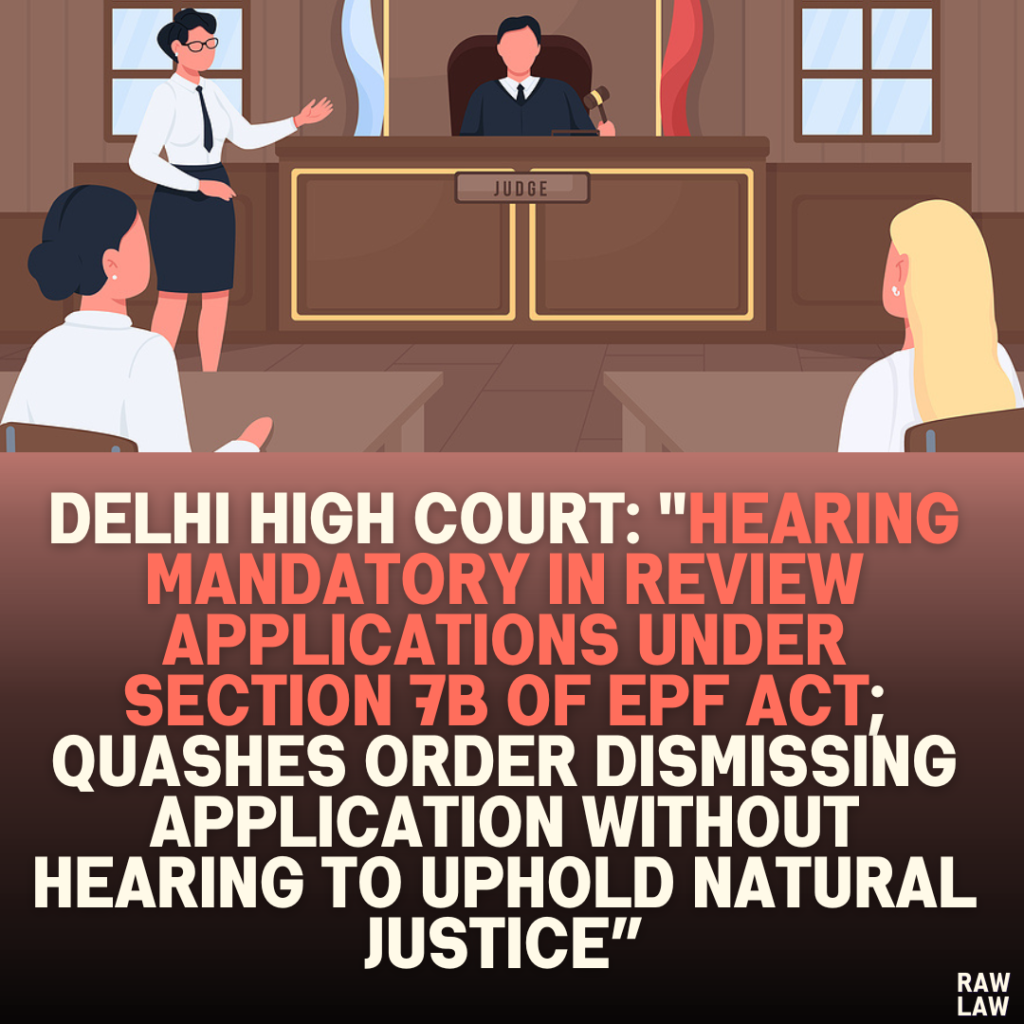Court’s Decision:
The Delhi High Court quashed the order passed by the Competent Authority, which had dismissed the petitioner’s Review Application under Section 7B of the EPF Act without granting them a hearing. The court found this action to be inconsistent with natural justice principles, as the petitioner was not given an opportunity to present their case or respond to the findings. The matter was remanded to the Competent Authority for reconsideration after affording both parties a hearing.
Facts:
- The petitioner, a cooperative society managing Panchshila Club, was subjected to an inspection under Section 7A of the EPF Act.
- The inspection covered the period from January 2000 to March 2016, during which the authority concluded that the petitioner owed ₹87,56,397 in provident fund dues.
- Dissatisfied with this determination, the petitioner filed a Review Application under Section 7B of the Act, asserting that the authority’s decision was flawed.
- The Review Application was dismissed by the Competent Authority, stating that it lacked new facts or supporting documents, and therefore, no sufficient grounds existed for review.
- The petitioner challenged this dismissal, arguing that the application was decided without granting them an opportunity to be heard.
Issues:
- Can the Competent Authority under Section 7B dismiss a Review Application without affording a hearing to the applicant?
- Does the dismissal of a Review Application without a hearing violate the principles of natural justice?
Petitioner’s Arguments:
- Violation of Right to Fair Hearing: The petitioner contended that the Competent Authority dismissed their Review Application without affording a fair hearing, thereby violating principles of natural justice.
- Failure to Consider Grounds for Review: The petitioner argued that the Competent Authority focused only on the absence of new evidence but failed to evaluate other grounds, such as errors apparent on the record or other sufficient reasons.
- Reliance on Precedent: The petitioner cited the M/s. Binod Kumar Jain v. Provident Fund Commissioner, EPFO, Ranchi judgment by the Jharkhand High Court, which held that a review applicant must be granted an opportunity to be heard before their application is dismissed.
Respondent’s Arguments:
- Denial of Hearing Not Prejudicial: The respondents argued that not every denial of hearing vitiates a decision. In this case, the petitioner suffered no prejudice due to the lack of a hearing.
- Support from Supreme Court Judgment: They relied on Managing Director, ECIL v. B. Karunakar, which states that procedural lapses like denying a hearing must be shown to cause prejudice before nullifying an order.
Analysis of the Law:
- Section 7B of EPF Act: This section allows for the review of orders passed under Section 7A based on new evidence, apparent errors, or other sufficient reasons. It also empowers the authority to reject applications lacking sufficient grounds.
- Interpretation by the Court: The Delhi High Court held that the provision under Section 7B(3), which allows rejection of applications with insufficient grounds, does not eliminate the need to hear the applicant. The term “where it appears to the officer” implies that the officer must evaluate the grounds after hearing the applicant.
Precedent Analysis:
- M/s. Binod Kumar Jain Case: The Jharkhand High Court ruled that even if Section 7B does not explicitly mandate a hearing before rejecting a review application, natural justice requires it. The judgment emphasized that no adverse order with civil consequences can be passed without granting the affected party a fair opportunity to present their case.
- Supreme Court’s Judgment in B. Karunakar: While the respondents relied on this judgment to argue that prejudice must be shown, the Delhi High Court distinguished it, noting that prejudice was evident in this case because the petitioner was deprived of an opportunity to present their case.
Court’s Reasoning:
- Importance of Natural Justice: The court reiterated that the right to be heard is a fundamental principle of natural justice. It exists to ensure fairness in administrative and judicial processes.
- Prejudice to Petitioner: The dismissal of the Review Application without a hearing denied the petitioner the opportunity to clarify their case, causing clear prejudice.
- Obligations of the Authority: The court observed that the Competent Authority focused only on the absence of new evidence while ignoring other grounds for review, such as apparent errors or sufficient reasons. This incomplete evaluation underscored the need for a hearing.
Conclusion:
The Delhi High Court set aside the dismissal order and remanded the matter to the Competent Authority. It directed both parties to appear on December 2, 2024, for a fresh hearing. The authority was instructed to pass a reasoned and speaking order after considering all aspects of the Review Application.
Implications:
- Reinforcement of Natural Justice: The judgment reaffirms that natural justice principles apply even when statutory provisions are silent. Authorities must afford a hearing before dismissing review applications.
- Fairness in Administrative Actions: The ruling ensures that parties are given a fair opportunity to present their case, particularly in proceedings with financial or civil consequences.
- Guidance for Competent Authorities: The judgment clarifies the procedural obligations of authorities under Section 7B, emphasizing the need for thorough and fair evaluations of review applications.
